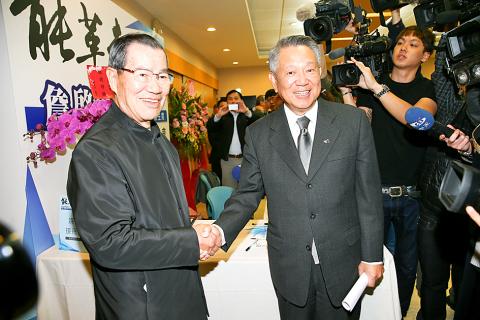Former Chinese Nationalist Party (KMT) vice chairman Steve Chan (詹啟賢) yesterday morning announced his decision to run in the KMT’s chairperson election, pledging to build a unified and tolerant party that aims to regain power in 2020.
Chan announced his candidacy at a news conference in Taipei, becoming the fifth KMT official to join the race scheduled for May 20 alongside KMT Chairwoman Hung Hsiu-chu (洪秀柱), KMT Vice Chairman Hau Lung-bin (郝龍斌), former vice president Wu Den-yih (吳敦義) and Taipei Agricultural Products Marketing Co general manager Han Kuo-yu (韓國瑜).
“[Healing] a divided Taiwan and a split KMT are our unavoidable tasks. We must change the current situation. In order to do that, we must begin with the KMT,” Chan said in his candidacy announcement speech.

Photo: CNA
Setting his goals for the KMT, Chan said the party must be united, tolerant and diversified and that he intends to reinvigorate its ideals, which he said helped create Asia’s first democratic nation and made Taiwan a beacon of democracy for Chinese communities around the world.
Chan said he also plans to reform the KMT to make it more in-sync with mainstream public opinion, so that the party is able to return Taiwan to its former prosperity, safeguard the Republic of China (ROC) and maintain cross-strait peace.
“The KMT does not need to worry about losing its party assets; our biggest assets are our creation of the ROC; safeguarding of freedom and democracy; our lofty ideals and the sacrifices we have made for the nation,” Chan said.
Prompted by a determination to push for another transfer of power and protect the nation’s peace and prosperity, Chan said the reason behind his candidacy is clear and simple — to put the KMT back in power in the 2020 presidential elections.
Chan said he only began to consider throwing his hat into the ring late last month, but expressed confidence that he would be able to meet all the candidacy requirements, including collecting enough signatures from KMT members.
Asked about his plans for the 2020 election, Chan said it is the ultimate goal of any political party to gain power and that he intends to nominate the best and most competent candidate for the job.
“I do not rule out myself [as the 2020 presidential candidate]. I will work toward that goal, but a lot could happen before the race,” Chan said.
Former vice president Vincent Siew (蕭萬長), who attended yesterday’s news conference in support of Chan, praised the former KMT vice chairman as a “reformer” and a trustworthy person.
Chan tendered his resignation on Jan. 7, reportedly due to divisions between him and Hung over how to handle the KMT’s questionable assets.

The Ministry of Economic Affairs has fined Taobao NT$1.2 million (US$36,912) for advertisements that exceed its approved business scope, requiring the Chinese e-commerce platform to make corrections in the first half of this year or its license may be revoked. Lawmakers have called for stricter enforcement of Chinese e-commerce platforms and measures to prevent China from laundering its goods through Taiwan in response to US President Donald Trump’s heavy tariffs on China. The Legislative Yuan’s Finance Committee met today to discuss policies to prevent China from dumping goods in Taiwan, inviting government agencies to report. Democratic Progressive Party Legislator Kuo Kuo-wen (郭國文) said

The Ministry of Economic Affairs has fined Taobao NT$1.2 million (US$36,900) for advertisements that exceeded its approved business scope and ordered the Chinese e-commerce platform to make corrections in the first half of this year or its license would be revoked. Lawmakers have called for stricter supervision of Chinese e-commerce platforms and more stringent measures to prevent China from laundering its goods through Taiwan as US President Donald Trump’s administration cracks down on origin laundering. The legislature’s Finance Committee yesterday met to discuss policies to prevent China from dumping goods in Taiwan, inviting government agencies to report on the matter. Democratic Progressive Party

Taiwan and its Pacific ally Tuvalu on Tuesday signed two accords aimed at facilitating bilateral cooperation on labor affairs, according to Taiwan’s Ministry of Foreign Affairs (MOFA). The governments inked two agreements in Taipei, witnessed by Foreign Minister Lin Chia-lung (林佳龍) and visiting Deputy Tuvaluan Prime Minister Panapasi Nelesone, MOFA said in a news release. According to MOFA, the agreements will facilitate cooperation on labor issues and allow the two sides to mutually recognize seafarers’ certificates and related training. Taiwan would also continue to collaborate with Tuvalu across various fields to promote economic prosperity as well as the well-being of their

Sung Chien-liang (宋建樑), who led efforts to recall Democratic Progressive Party (DPP) Legislator Lee Kun-cheng (李坤城), was released on bail of NT$80,000 today amid outcry over his decision to wear a Nazi armband to questioning the night before. Sung arrived at the New Taipei District Prosecutors’ Office for questioning in a recall petition forgery case last night wearing a red armband bearing a swastika, carrying a copy of Adolf Hitler’s Mein Kampf and giving a Nazi salute. Sung left the building at 1:15am without the armband and covering the book with his coat. Lee said today that this is a serious